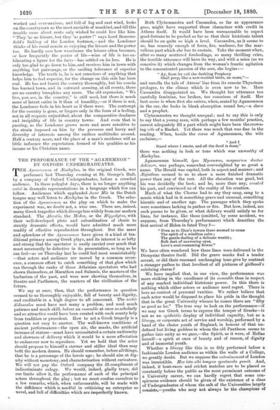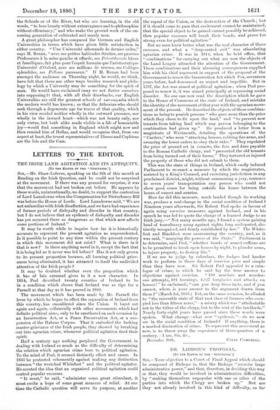THE PERFORMANCE OF THE " AGAMEMNON " BY OXFORD UNDERGRADUATES.
THE Agamemnon of iEschylus, in the original Greek, was performed last Thursday evening at St. George's Hall, by a company of Oxford Undergraduates, before a crowded audience. In these polyglot days, there is no longer anything outrg in dramatic representations in a language which few can follow. Audiences which applauded Anne Mie in the Dutch tongue may well listen to .Eschylus in the Greek. The selec- tion of the Agamemnon as the play on which to make the experiment was, we doubt not, a wise one. There are, indeed, many Greek tragedies which diverge less widely from our modern standard. The Alcestis, the Medea, or the Hippolytus, with their well-developed plots and subordination of choric to strictly dramatic effects, would have admitted much more readily of effective reproduction throughout. But the mass and splendour of the Agamemnon have given it a kind of tra- ditional primacy among Greek plays, and its interest is so lofty and strong that the spectator is easily carried over much that must necessarily be defective in its presentation, so long as he can feel—as on Thursday last he could feel most unmistakably —that actors and audience are moved by a common rever- ence, a common effort to catch something of that glow which ran through the ranks of those Athenian spectators who had shown themselves, at Marathon and Salamis, the masters of the barbarism of the past, and were now showing themselves, in theatre and Parthenon, the masters of the civilisation of the future.
We say at once, then, that the performance in question seemed to us thoroughly enjoyable, full of beauty and dignity, and creditable in a high degree to all concerned. The archi- didascalos must have met many a problem, and used much patience and much skill, before an ensemble at once so scholarly and so attractive could have been created with such scanty help from tradition or precedent. How to act a Greek tragedy is a question not easy to answer. The well-known conditions of ancient performances—the open air, the masks, the artificial increase of stature—must have necessitated a certain uniformity and slowness of delivery which it would be a mere affectation to endeavour now to reproduce. Yet we hold that the actor should propose to himself a sterner and stiller ideal than may befit the modern drama. He should remember, before all things, that ho is a personage of the heroic age ; he should aim at dig- nity without monotony, and characterisation without caricature. We will not pay the Oxford company the ill-compliment of indiscriminate eulogy. We would, indeed, gladly trace, did our limits allow it, the performance of each of the principal actors throughout the play ; but we must confine ourselves to a few remarks, which, when unfavourable, will be made with the diffidence which is medial in criticising an enterprise so novel, and full of difficulties which are-imperfectly known.
Both Clytmmnestra and Cassandra, so far as appearance goes, might have supported those characters with credit in Athens itself. It would have been unreasonable to expect good-fortune to be pushed so far as that their histrionic talent should be on quite so high a level. Cassandra, as it seems to us, has scarcely enough of force, fire, madness, for the mar- vellous part which she has to sustain. Take the moment when, after so many muttered forebodings, so many thrilling cries, the terrible utterance will have its way, and with a mien (as we conceive it) which changes from the woman's frantic agitation to the concentrated passion of the seer, she begins:-
" Ay, from its veil the darkling Prophecy Shall peep, like a new-wedded bride, no more,"—
and unrolls the tale of Atreus' line from its remote Thyestean prologue, to the climax which is even now to be. Here Cassandra disappointed us. We thought her utterance too carefully feminine, too broken, too conscious of itself. Her best scene is when first she enters, when, seated by Agamemnon in the car, she looks in blank absorption round her,—a slave and a prophet.
Clytmmnestra we thought unequal ; and to say this is only to say that a young man, with perhaps a few months' practice, cannot adequately fill a part which might have been the crown- ing role of a Rachel. Yet there was much that was fine in the reading. When, beside the corse of Agamemnon, the wife exclaims,—
" And I
Stand where I smote, and all the deed is done,"
there was nothing in look or tone which was unworthy of /Eschylus.
Agamemnon himself, ipse Mycenceus, magnorum dueler Achivom, was perhaps, somewhat overweighted by so great a name. The Herald was capital, both in aspect and manner ; and lgisthus seemed to us to show a more finished dramatic power than any of the rest. All the elocution was good, but his was decidedly the best; and he, more than any, created his part, and convinced us of the reality of his creation.
Much of what the Chorus had to say they sang, sang to a music which had in it something grave and unusual, something hieratic and of another age. The passages which they spoke were sometimes lacking in pathos or fire. But how, indeed, are such poems to be given, or what delivery would satisfy us for lines, for instance, like those (omitted, by some accident, we suppose, from Thursday's performance) which describes the first arrival of Helen in fated Troy P-
" Even so to Ilion's towers there seemed to come
The spirit of a windless calm ; The gentle darling of a delicate wealth ; Soft dart of answering eyes, Love's soul-consuming flower."
We have often wondered how these lines Were delivered in the Dionysiac theatre itself. Did the grave masks find a tender accent, or did their resonant unchanging tone give by contrast a stranger pathos to that loveliest of all pictures of girlhood's subduing charm P We have implied that, in our view, the performance was more striking in the excellence of its ensemble than in respect of any marked individual histrionic power. In this there is nothing which either actors or audience need regret. There is here no contest of personal vanities. We rather believe that each actor would be disposed to place his pride in the thought that in the great University whence he comes there are "fifty as good as he." The true way to look on the performance—if we may use Greek terms to express the temper of Greeks—is not as an epidektic display of individual capacity, but as a liturgy, or corporate act of service and worship, performed by a band of the choice youth of England, in honour of that un- defined but living goddess in whom the old Pantheon seems to gather into unity as we gaze,—the Spirit, as it were, of Hellas herself—a spirit at once of beauty and of reason, of dignity and of immortal youth.
Whether a liturgy like this is so fitly performed before a fashionable London audience as within the walls of a College, we greatly doubt. But we suppose the entrainment of London was irresistible. Hoc ista sibi tempus spectacula poscit. And, indeed, if boat-races and cricket matches are to be placed so constantly before the public as the most prominent outcome of a University career, we can hardly regret that some con- spicuous evidence should be given of the existence of a class of Undergraduates of whom the salt of the Universities largely
consists,—yonths who may not always be the champions of
the Schools or of the River, but who are learning, in the old words, " to love beauty without extravagance and to philosophise without effeminacy," and who make the ground work of the on- coming generation of cultivated and manly men.
A great philosopher has compared the German and English Universities in terms which have given little satisfaction in either country. " Une Universite allemande de dernier ordre," says M. Renan, "avec ses petites habitudes etroites, see pauvres Professeurs it la mine gauche et effaree, ses Privaldocents haves et fameliques, fait plus pour l'esprit humain que l'aristocratique Universite d'Oxford, avec ses millions de revenu, ses ColliTes splendides, ses Fellows paresseux." If M. Renan had been amongst the audience on Thursday night, he would, we think, have felt that there are other ways besides research and philo- logy by which a University may do something for the spirit of man. He would have exclaimed (may we not flatter ourselves into supposing ?) that, with all their drawbacks, our English Universities are still the greatest schools of zamma-pagia which the modern world has known ; so that the Athenian who should seek through a degenerate age for traces of that quality, which in his view resided neither wholly in the outward presence, nor wholly in the inward heart—which was not beauty only, nor .only virtue, but both alike made visible in a life of honourable joy—would find something in England which might now and then remind him of Hellas, and would recognise that, from one aspect at least, the truest representatives of Mesas and Cephisus are the Isis and the Cam.







































 Previous page
Previous page